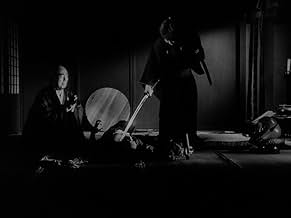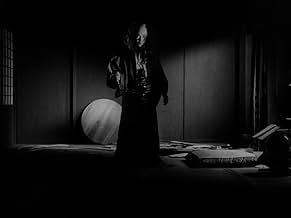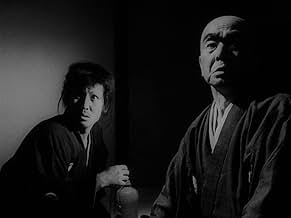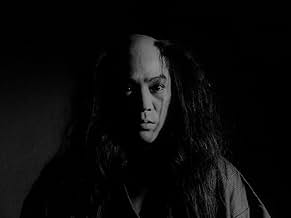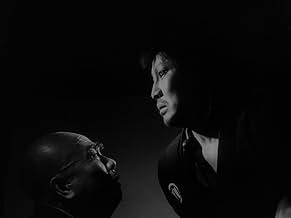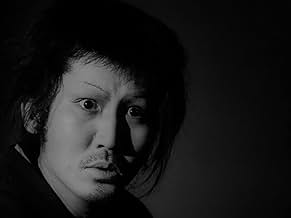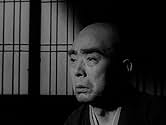IMDb-BEWERTUNG
7,9/10
3259
IHRE BEWERTUNG
Füge eine Handlung in deiner Sprache hinzuAfter being robbed by a geisha, a ronin warrior carves a bloody path to seek revenge.After being robbed by a geisha, a ronin warrior carves a bloody path to seek revenge.After being robbed by a geisha, a ronin warrior carves a bloody path to seek revenge.
- Regie
- Drehbuch
- Hauptbesetzung
Empfohlene Bewertungen
A heartbroken samurai in deep need of money is pushed to the edge and seeks revenge for his poor soul. But as he goes deeper with his revenge, discovers the people who stifled him may not be as different of people after all.
Pretty much a stylistic film akin to other famous Film Noir of the 40s and 50s. I would even categorize it as 'Gothic' and verging towards Expressionism with its deep saturated shadows and lighting that shadows the mental state of the film's characters. Its such a vision to be honest.
The story is what I believe is the weakest of the story. Its somewhat standard in a sense AND if you know his other film, you kinda knew what will happens. Its not as left field AND thematically rich compared to Funeral Parade of Roses. It's a story that had been told a hundred times AND while unique in its infusion of his dreamy stylings - it does not really feel like it adds much to the film. It works but not in a magical way that his early works shine through. It's more or less a preference thing on my side.
Acting wise, this is such a masterful direction. It is also Gothic by nature AND there is a sense of surrealism in how elevated their performances are. It perfectly matches the highly stylistic nature of the film, which I love. Katsuo Nakamura is amazing in his performance as a crazed samurai who just wants some money to escape his position. He really captures what this films what to evoke. Its kinda sad looking into his filmography that he seems to have gotten the prestige I think he could have.
Overall, a very worthy film to watch. It holds well against Funeral Parade AND shows a master stylist who knows how to modulate performers to boot.
Pretty much a stylistic film akin to other famous Film Noir of the 40s and 50s. I would even categorize it as 'Gothic' and verging towards Expressionism with its deep saturated shadows and lighting that shadows the mental state of the film's characters. Its such a vision to be honest.
The story is what I believe is the weakest of the story. Its somewhat standard in a sense AND if you know his other film, you kinda knew what will happens. Its not as left field AND thematically rich compared to Funeral Parade of Roses. It's a story that had been told a hundred times AND while unique in its infusion of his dreamy stylings - it does not really feel like it adds much to the film. It works but not in a magical way that his early works shine through. It's more or less a preference thing on my side.
Acting wise, this is such a masterful direction. It is also Gothic by nature AND there is a sense of surrealism in how elevated their performances are. It perfectly matches the highly stylistic nature of the film, which I love. Katsuo Nakamura is amazing in his performance as a crazed samurai who just wants some money to escape his position. He really captures what this films what to evoke. Its kinda sad looking into his filmography that he seems to have gotten the prestige I think he could have.
Overall, a very worthy film to watch. It holds well against Funeral Parade AND shows a master stylist who knows how to modulate performers to boot.
'Shura' also known as 'Demons' or 'maybe even better known as 'Pandemonium' is second feature by great experimenter Toshio Matsumoto. It is one of the most experimental samurai films I have ever seen, and one of the most disturbing revenge stories. The film begins with colorful sun setting to transform into bleak black and white cinematography. After a geisha deceives a samurai and robs him together with her husband, the samurai starts the bloody and twisted path of revenge that unravels many secrets and treats the viewer with such twists that makes M. Night Shyamalan go green with jealousy. The film is cool mixture of classic samurai movies and film-noir with the tasty sauce of Matsumoto's experimental techniques. More straightforward and less surreal than the director's better known 'Funeral Parade of Roses'.
I don't know that there's anything in this movie which blew me away, but there was also nothing which bothered me either. I suppose the plot is a fairly straightforward revenge story, but the stylistic elements of the film were more than enough to save the film. For instance, I liked the usage of darkness and shadows in several scenes. I don't know if I can quite put my finger on why those elements work, but something about seeing various characters appear/disappear from the shadows gives the film a dreamy aesthetic. I also liked how certain scenes were repeated. Through these scenes, you get a sense of Gengobei imagining how he wants to behave in certain situations or how some of the violence he commits or witnesses it etched into his head. These scenes also cause the film to become a subjective experience which puts you in Gengobei's headspace really well. Finally, the high level of violence also surprised me. While certain elements like the slow motion and the (relatively) high levels of blood help in this regard, that most of the deaths are prolonged gives them even more staying power. All things considered, this is definitely the most violent classic samurai film I've seen. As I said at the start of this review, I wouldn't say this film blew me away, but I do have a lot of respect for the film's technical qualities. It's a stylistically impressive take on the revenge film which is so unique with its craft that you eventually stop caring about its somewhat barebones plot.
Demons is an adaptation of Tsuruya Namboku's play Kamikakete Sango Taisetsu, a kabuki theater classic based on an episode of the 47 rônins. It goes deeper, darker and crueler, than any other samurai movies I've seen. its pure malice. And thrives on diabolical suspense. Its a mans journey through hate and revenge, and his descent into madness, it is slow, painful and bloody. A remarkable exercise in cynical nihilism that is so breathtakingly grim that it becomes undeniably compelling. Along with Katsuo Nakamura's haunting performance in the lead role.
The story is not realistic. The setting and the intruducing course of action is undoubtly surreal, and almost every character in Demons is unsympathetic and devious with the possible exception of Hachiemon, who is so selfless in his sacrifices for his master that he becomes annoyingly obsequious. But thats part of the films appeal.
Matsumoto adopts an expressionist aesthetic similiar to the theatrical- play. And the editing accumulates false starts and several scenes are repeated almost identically, first dreamed then in real life. This can be very confusing and it creates incessant ruptures which breaks the narrative fluidity.
Demons is not perfect but its appeal is one you rarely see in cinema, and, of course, it has an extrodinary story and directing which thus class thus as one of world-cinemas timeless gems.
The story is not realistic. The setting and the intruducing course of action is undoubtly surreal, and almost every character in Demons is unsympathetic and devious with the possible exception of Hachiemon, who is so selfless in his sacrifices for his master that he becomes annoyingly obsequious. But thats part of the films appeal.
Matsumoto adopts an expressionist aesthetic similiar to the theatrical- play. And the editing accumulates false starts and several scenes are repeated almost identically, first dreamed then in real life. This can be very confusing and it creates incessant ruptures which breaks the narrative fluidity.
Demons is not perfect but its appeal is one you rarely see in cinema, and, of course, it has an extrodinary story and directing which thus class thus as one of world-cinemas timeless gems.
It is sometime during the Edo period, and Soemon is a Ronin living under the assumed name of Gengobe in Fukugawa, Tokyo. Indebted and unable to acquire the necessary funds to join the 47 Ronin in their quest of vengeance, he spends his days drinking sake and his nights with geishas. One geisha in particular: Koman, who pledges her eternal love for him. This love proves to be fickle, for Koman is a married woman. After his servant Hachiemon acquires 100 Ryo for Soemon to join the Ronin, he is quickly swindled by Koman and her husband Sangorô. Left penniless once more, Soemon descends into a bloody spiral of insanity and violence from which he may never return.
Written and directed by Toshio Matsumoto- and based on the Kabuki play 'Kamikakete Sango Taisetsu' by Nanboku Tsuruya and Shûji Ishizawa- 'Shura' is a strikingly photographed tale of revenge and madness that plays like a samurai film noir. Containing hard-hitting violence, a cynical anti-hero and a duplicitous femme fatale, the film bears many of the hallmarks that informed the noir movement of the 40's and 50's. Told in a non-linear fashion, the narrative incorporates flashbacks, alternative scenarios and repetition, challenging and confusing the viewer. The story is a gritty, dark one, maintaining a bleak and fatalistic tone, which is only heightened by the striking cinematography from Tatsuo Suzuki.
Shot in black and white, Suzuki makes excellent, evocative use of light and shadows, creating a startling contrast that adds a sinister sense of despair and claustrophobia to proceedings. His usage of dissolves, super-impositions, angled shots and zooms heightens the narrative tension, whilst also lending the film a surreal, eerie quality that strengthens the narrative impact. Suzuki also utilises the minimalist sets- a nod to the film's origins in Kabuki theatre- masterfully, making the most of the limited spaces in an artful and imaginative way.
A frequent collaborator of Matsumoto's- working on at least three of his films, including the acclaimed 'Funeral Parade of Roses'- Suzuki was at the forefront of Japanese experimental cinema. Working alongside a variety of independent directors, Suzuki made a name for himself as an innovator in terms of cinematography and its capabilities. His avant-garde work could very well be seen as influential on, or as a forerunner to, the work of Shinya Tsukamoto, or even David Lynch. Here, he leaves the audience wide-eyed in wonder at the eerie, noiresque imagery- be it of apparent floating lamps chasing our central character or the beautiful visage of a geisha, highlighting the torment in her eyes. Throughout 'Shura,' Suzuki's efforts don't just bolster the narrative and its tone- they leave you spellbound.
As do the intense performances from the cast, most notably Katsuo Nakamura as Soemon. A former Kabuki actor, Nakamura displays his character's complex emotions and inner turmoil fantastically, utilizing expressive gestures, movements and facial expressions. He interacts with the rest of the cast convincingly, painting a compelling portrait of a man driven to madness and violence by the actions of others. Alongside him, Yasuko Sanjo delivers a masterclass in understatement as the geisha Koman. She brings much grace and elegance to the role, perhaps accrued from her years as a dancer, leaving an indelible impression on the viewer. Masao Imafuku also does fine work as the servant Hachiemon, the only real honorable one in the film; stealing every scene he's in.
Although those who shy away from violent films might not appreciate the amount of gore in 'Shura', anyone who enjoys Samurai movies, or a good revenge story, will likely be most pleased by the film. Beautifully shot by Tatsuo Suzuki and featuring commendable performances from all in the cast, there's a lot going for it. A strong narrative, deft direction- 'Shura' may be one of the best Samurai film noirs you'll ever see.
Written and directed by Toshio Matsumoto- and based on the Kabuki play 'Kamikakete Sango Taisetsu' by Nanboku Tsuruya and Shûji Ishizawa- 'Shura' is a strikingly photographed tale of revenge and madness that plays like a samurai film noir. Containing hard-hitting violence, a cynical anti-hero and a duplicitous femme fatale, the film bears many of the hallmarks that informed the noir movement of the 40's and 50's. Told in a non-linear fashion, the narrative incorporates flashbacks, alternative scenarios and repetition, challenging and confusing the viewer. The story is a gritty, dark one, maintaining a bleak and fatalistic tone, which is only heightened by the striking cinematography from Tatsuo Suzuki.
Shot in black and white, Suzuki makes excellent, evocative use of light and shadows, creating a startling contrast that adds a sinister sense of despair and claustrophobia to proceedings. His usage of dissolves, super-impositions, angled shots and zooms heightens the narrative tension, whilst also lending the film a surreal, eerie quality that strengthens the narrative impact. Suzuki also utilises the minimalist sets- a nod to the film's origins in Kabuki theatre- masterfully, making the most of the limited spaces in an artful and imaginative way.
A frequent collaborator of Matsumoto's- working on at least three of his films, including the acclaimed 'Funeral Parade of Roses'- Suzuki was at the forefront of Japanese experimental cinema. Working alongside a variety of independent directors, Suzuki made a name for himself as an innovator in terms of cinematography and its capabilities. His avant-garde work could very well be seen as influential on, or as a forerunner to, the work of Shinya Tsukamoto, or even David Lynch. Here, he leaves the audience wide-eyed in wonder at the eerie, noiresque imagery- be it of apparent floating lamps chasing our central character or the beautiful visage of a geisha, highlighting the torment in her eyes. Throughout 'Shura,' Suzuki's efforts don't just bolster the narrative and its tone- they leave you spellbound.
As do the intense performances from the cast, most notably Katsuo Nakamura as Soemon. A former Kabuki actor, Nakamura displays his character's complex emotions and inner turmoil fantastically, utilizing expressive gestures, movements and facial expressions. He interacts with the rest of the cast convincingly, painting a compelling portrait of a man driven to madness and violence by the actions of others. Alongside him, Yasuko Sanjo delivers a masterclass in understatement as the geisha Koman. She brings much grace and elegance to the role, perhaps accrued from her years as a dancer, leaving an indelible impression on the viewer. Masao Imafuku also does fine work as the servant Hachiemon, the only real honorable one in the film; stealing every scene he's in.
Although those who shy away from violent films might not appreciate the amount of gore in 'Shura', anyone who enjoys Samurai movies, or a good revenge story, will likely be most pleased by the film. Beautifully shot by Tatsuo Suzuki and featuring commendable performances from all in the cast, there's a lot going for it. A strong narrative, deft direction- 'Shura' may be one of the best Samurai film noirs you'll ever see.
Wusstest du schon
- WissenswertesIncluded among Letterboxd's Top 250 Horror Films.
Top-Auswahl
Melde dich zum Bewerten an und greife auf die Watchlist für personalisierte Empfehlungen zu.
- How long is Demons?Powered by Alexa
Details
- Laufzeit
- 2 Std. 14 Min.(134 min)
- Farbe
- Sound-Mix
- Seitenverhältnis
- 1.37 : 1
Zu dieser Seite beitragen
Bearbeitung vorschlagen oder fehlenden Inhalt hinzufügen

